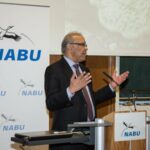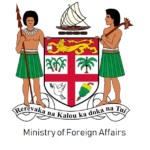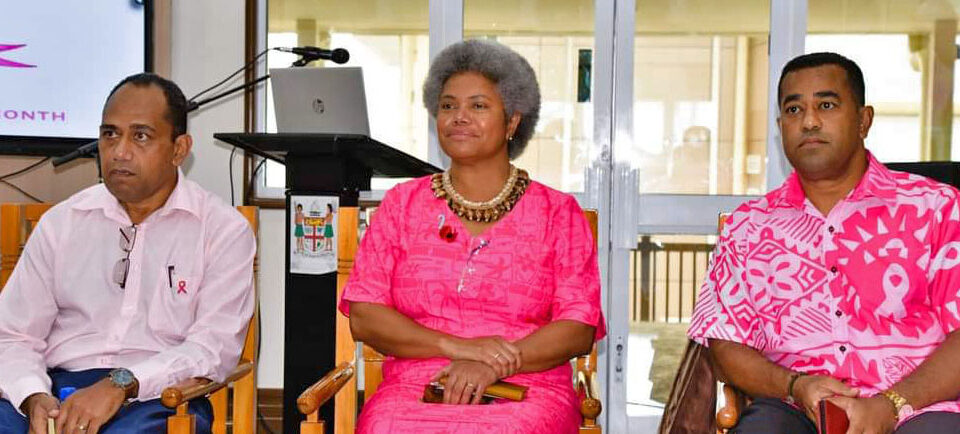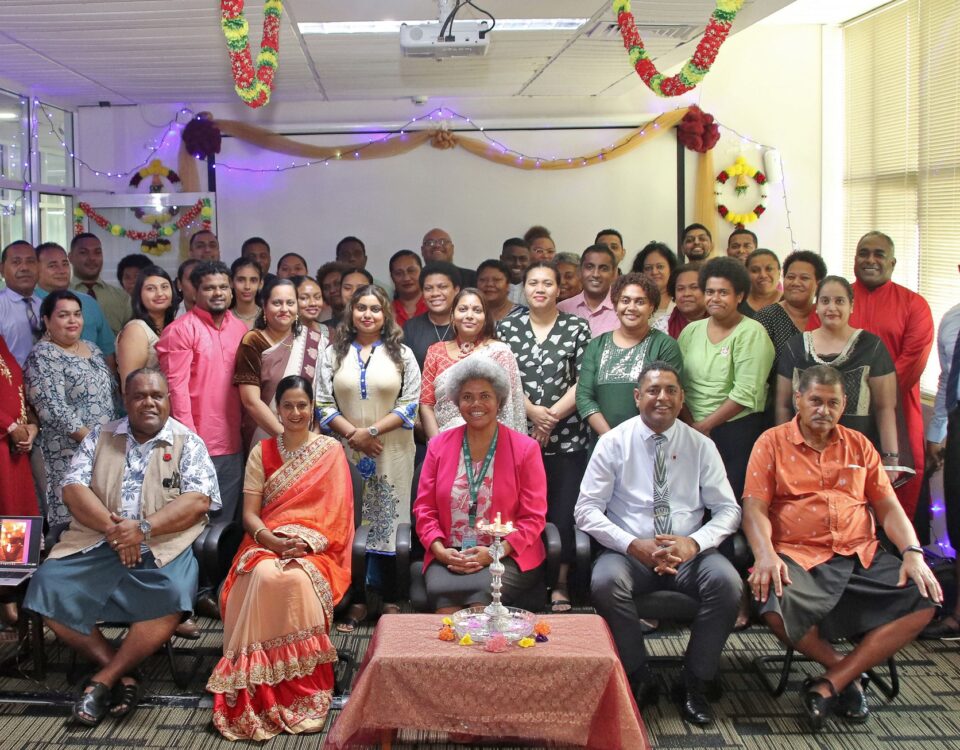
Fijian envoy calls for more awareness on Oceans Health
18/11/2017
UN Expert, A-G address rights for those with Albinism-related Disabilities
05/12/2017Published On: 23/11/2017
We return to Fiji having made truly remarkable progress for our country, for the Pacific, for every climate-vulnerable nation, and for the world. COP23 has given a voice to smaller nations that have been most affected by climate change, but who have previously not had a sizeable role in negotiations. It has brought together the international community in the same canoe, the same drua, to drive decisive action to limit the rate of global warming.
Together, we launched the Ocean Pathways Partnership to drive action to protect our oceans from climate effects, we reached a historic agreement on agriculture, an action plan on gender and a decision that benefits local communities and indigenous peoples. We also secured greater funding for critical climate adaptation work, and took the next step in ensuring that the Adaptation Fund shall serve the Paris Agreement. And finally, we launched a global partnership to provide millions of climate-vulnerable people around the world with affordable access to insurance. So not only did we advance the implementation of the Paris Agreement, we made our mark as the first small island developing state to lead the negotiations –we made the voices of climate-vulnerable SIDS heard, and we put our interests at the top of the agenda.
And for Fiji, the attention surrounding our climate leadership has already yielded many fruits. We have attracted hundreds of millions of dollars in green infrastructure projects that will not only make Fiji more climate resilient, but will also boost our thriving economy. These projects, from the likes of the World Bank, the Green Climate Fund, the EIB, and the Leonardo DiCaprio Foundation, will make our villages more secure, our water and electricity cleaner, and, will help us build a brighter and more resilient future for Fiji. And the value of all of the exposure Fiji gained from COP23 is immense, and would have been otherwise unthinkable. Already, the global interest in tourism is seeing a boost, with visits to Tourism Fiji’s website spiking from places far and wide. Indeed, if you were in Bonn, you would be amazed by the amount of foot traffic that we received through the Fiji Pavilion. And nations from across the globe have dedicated new resources to rebuilding our schools, re-planting our mangroves, and launching both the Drua Insurance Incubator and the Fiji Clearinghouse for Risk Transfer. All of these accomplishments are directly traced to the spotlight that Fiji gained from COP23, all will directly benefit Fiji, and, thanks to generous support from the international community, all came at zero expense to the Fijian taxpayer.
Further still, this COP has made the world aware of Fiji in a way that has never been experienced in our nation’s history. To the international community, we are more than a vacation spot, and more than a rugby powerhouse—Fiji is now a global leader. We are at the forefront of the most pressing issue of our time, climate change. While the responsibility is great, it is one that, with your continued support, will cement these years in Fijian history as among the most important in our history.
Having a large-scale welcome ceremony to greet our COP23 delegation upon their return to Fiji was not the intent of the Government, the Honourable Prime Minister, or his team. The reported plans for a public event were the result of independent planning by a few well-intentioned, but perhaps naive, civil servants. Instead, in keeping with tradition, the Ministry of iTaukei Affairs will honour the hard work and successes of our entire delegation by holding a traditional ceremony and prayer on their premises, much like they did upon the departure of the Honourable Prime Minister to Bonn.
While Fiji already has much to be proud of, with the Fijian COP Presidency now officially underway, our journey has just begun. To every Fijian who held us in your thoughts and prayers throughout COP23, we extend a special vinaka vakalevu, and we ask for your continued prayers and support throughout the year ahead.
ACCOMPLISHMENTS FROM COP23:
EIB Water and Wastewater Infrastructure Partnership: The European Investment Bank (EIB) partnered with the Fijian Government to fund a water and wastewater investment programme to better protect water infrastructure against natural disasters in Fiji and strengthen the resilience of water distribution and wastewater treatment. The project will focus on improving current service levels, reduce leakages and enable quicker resumption of water supply following cyclones. EIB and the Fijian Government signed a $75 million loan agreement to support the project.
Drua Insurance Incubator: An important new initiative to develop finance and insurance products that are tailor-made to the needs and circumstances of vulnerable and low-income households in Fiji and other Pacific Island Countries. The Pacific Climate Finance and Insurance Incubator – known as the Drua Incubator – will bring together leaders in finance, investment and insurance to develop and “incubate” transformational and scalable financial and insurance products that meet the specific requirements of Pacific Small Island Development States. The Government of Luxembourg has agreed to provide initial funding of €1 million euros for the initiative.
Climate Vulnerability Assessment: At the request of the Fijian Government, the Word Bank carried out a Climate Vulnerability Assessment (CVA) of Fiji to identify the scale of climate risks posed to Fiji to better inform climate adaptation measures. The CVA determined Fiji’s annual losses due to extreme weather events could reach 6.5 per cent of GDP by 2050 and that an estimated $9.3 billion over the next 10 years is required to finance adaptation work across Fiji. The CVA will have a direct impact on Fiji’s critical climate adaption work to ensure resources are allocated appropriately in vulnerable regions across the country.
International Partnership for Blue Carbon: An initiative launched at COP21 in Paris that aims to build awareness, share knowledge and accelerate action to protect and restore coastal blue carbon ecosystems for climate change mitigation and adaptation. At COP23, Australia committed an additional $9.4 million towards the initiative to support efforts to protect and manage coastal blue carbon ecosystems in the Pacific, in partnership with Fiji and other Pacific Island Countries.
2018 Talanoa Dialogue: After extensive consultations, the Fijian COP23 Presidency announced an inclusive and participatory process that allows countries, as well as non-state actors, to share stories and showcase best practices in order to urgently raise ambition – including pre-2020 action – in nationally determined contributions (NDCs). This is ultimately to enable countries to collectively move closer to the more ambitious Paris Agreement goal of keeping the rise in global temperature to 1.5 degrees Celsius.
Implementation Guidelines: While important work remains to be done, COP23 made significant progress toward clear and comprehensive implementation guidelines for the Paris Agreement, which will make the agreement operational. This is crucial to help governments plan their economies, and give confidence to investors and businesses that the low-carbon economy is here to stay. Countries will need to finalise the implementation guidelines at COP24 in Poland next year.
Launch of Ocean Pathway Partnership: The Fijian COP23 Presidency launched the Ocean Pathway Partnership to encourage the climate negotiations process to address the relationship between climate change and the ocean. In the true spirit of the Grand Coalition, the partnership will also consolidate existing work being done to create a coordinated effort among governments at all levels, existing ocean alliances and coalitions, civil society and the private sector to create a stronger link between climate action and a healthy ocean. The partnership will be co-chaired by Fiji and Sweden, who are joining forces again after leading the inaugural UN Ocean Conference in July.
Launch of InsuRelience Global Partnership: The German Federal Ministry for Economic Cooperation and Development (BMZ) contributed 110 million euros (US $125 million) to launch the InsuResilience Global Partnership for Climate and Disaster Risk Finance and Insurance Solutions to bring affordable insurance and other financial protection to millions of vulnerable people around the world. The contribution from BMZ follows a £30 million (US $39 million) commitment that was made by the Government of the United Kingdom in July.
Launch of the Fiji Clearing House for Risk Transfer: This new online resource will help connect vulnerable countries with the best available information on affordable insurance and solutions – tailored to their unique circumstances – that will allow them to better prepare for the risks posed by climate change.
Finalisation of the Gender Action Plan: Countries finalised the first-ever Gender Action Plan, which aims to increase the participation of women in all UNFCCC processes. It also seeks to increase awareness of and support for the development and effective implementation of gender-responsive climate policy at all levels of government.
Finalisation of the Local Communities and Indigenous Peoples Platform: This platform will provide direct and comprehensive means to give a greater voice to local and indigenous people in the climate negotiations and allow them to share their traditional knowledge and best practices on reducing emissions, adapting to climate change and building resilience.
Historic Breakthrough in Agriculture: Countries reached a historic agreement on agriculture that will help countries develop and implement new strategies for adaptation and mitigation within the sector, to both reduce emissions as well as build resilience to the effects of climate change. This was historic because it was the first time in the history of the climate negotiations that countries had reached an agreement on agriculture.
Adaptation Fund: The Adaptation Fund was replenished with a total of US $93.3 million, exceeding this year’s funding target by US $13 million. The Adaptation Fund has a track record of providing valuable resources to communities in developing countries for projects that help improve resilience to the effects of climate change. Projects may apply for funding to Adaptation Fund Board, which reviews applications through a transparent process. Countries also took the important next step to ensure that the Adaptation Fund shall serve the Paris Agreement.
America’s Pledge: A delegation of sub-national leaders led by Gov. Jerry Brown of California and former New York City Mayor Michael Bloomberg presented a report on the ongoing efforts by American states, cities, businesses and civil society to uphold the emissions reduction target of the United States under the Paris Agreement.
Bonn-Fiji Commitment: Local and regional leaders gathered to officially adopt the Bonn-Fiji Commitment of Local and Regional Leaders to Deliver the Paris Agreement at All Levels, a pledge that signals their commitment to bring forward a critical shift in global development. The Bonn-Fiji Commitment highlights the pledge to raise collective ambition for climate action.
Launch of the NDC Regional Hub: The NDC Partnership is establishing a new regional hub to support the implementation of NDCs in the Pacific. The Regional Pacific NDC Hub will be based in Suva, Fiji, and will provide expertise for developing regional solutions to mitigate global warming and enhance efforts by Pacific islands to adapt to climate change.
Health Initiative for the Vulnerable: The World Health Organisation, in collaboration with the UNFCCC and the Fijian COP23 Presidency launched a special initiative to protect people living in Small Island Developing States from the health impacts of climate change. Its goal by 2030 is to triple the levels of international financial support to climate and health in Small Island Developing States.
First Open Dialogue between Governments and Non-Stare Actors: The Fijian COP23 Presidency presided over the first ever Open Dialogue between governments and non-state actors (including civil society, municipal governments and businesses) within the formal climate negotiations. Discussions were held surrounding two important topics. The first was how non-state actors can help countries design and implement more ambitious NDCs and the second was how to better integrate NPS into the climate negotiations process. Based on the success of the dialogue, there was strong enthusiasm to continue similar discussions at future COP meetings.
Expert Dialogue on Loss and Damage: Provides important space to raise awareness about the vulnerability of small island states. It will explore options for mobilising expertise, technology and support for the victims of climate change.





